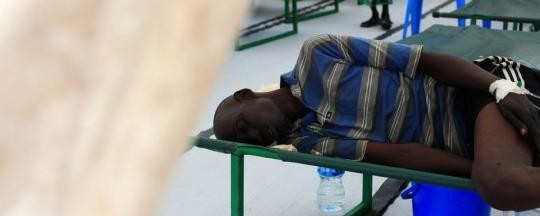South Sudan’s Ministry of Health (MOH) has refused to declare a cholera outbreak despite ten confirmed cases in Juba and nine deaths from suspected cases this month.
According to a cholera response situation report seen by Radio Tamazuj, as of 18 June there have been seven confirmed cases inside the displaced persons camp at Juba’s UN base and three cases confirmed from patients outside the base.
The report said there have been another 85 suspected cases reported in South Sudan, with nine deaths. Four people died in health facilities. None of the deaths have been inside the UN base.
The majority of the suspected cases have been received from Juba’s Manga 10 neighborhood and the UN base in Juba, the report said. Fewer than half of the suspected cases have been tested so far.
According to World Health Organization guidelines, a cholera outbreak should be declared when there are 10-20 confirmed cases, but sources say the Minstry of Health has refused to do so.
“MOH is keeping quiet without any early measures,” said one medical source at Juba Teaching Hospital.
Two other separate sources close to the cholera response said the Ministry decided not to declare an outbreak despite urging by international health organizations.
Last year the Ministry declared an outbreak in May after confirmation of 18 cases – in line with WHO recommendations. By December of that year, there were 6,421 cases including 167 deaths after the outbreak spread to 16 counties across five states.
Dr. John Rumunu, Director General of Preventive Health Services in the Ministry of Health, did not mention any confirmed cases of cholera in an emailed response to questions from Radio Tamazuj.
He only mentioned that there are cases of acute watery diarrhea in Juba teaching hospital which are under surveillance for cholera but they have not yet been confirmed. Acute watery diarrhea presents some of the same symptoms as cholera.
“The Ministry of Health and Partners have staged up surveillance, preparedness, and response activities to address this while waiting for confirmation of results from accredited laboratory,” Rumunu said. “The Ministry of Health will make a public statement when lab results are confirmed.”
However, another source told Radio Tamazuj that the ten cases were alredy confirmed at a lab in Juba but the Ministry of Health decided to send the samples to Kenya for secondary confirmation.
Rumunu did not respond when asked why the Ministry would send samples to a Kenyan lab instead of trusting the results in Juba. Even so, he advised the public to take precautions to avoid cholera.
“It is worth mentioning that, last year Cholera outbreak started around the same time and therefore we advise the public to adhere to Cholera prevention messages- Drinking clean water and eating food which is not contaminated with human or animal excreta. We advise people to observe hand washing practice, boil or treat drinking water with chlorine tablets, avoid eating food sold in unhealthy environment and uncooked food.”
South Sudan confirmed its first cholera case this year on 1 June. That case was not made public for more than a week until information was leaked to Radio Tamazuj. A WHO representative had declined to comment on that case, referring to the Ministry of Health.
Related:
Document: South Sudan government seeks to silence famine warnings (5 Aug.)




